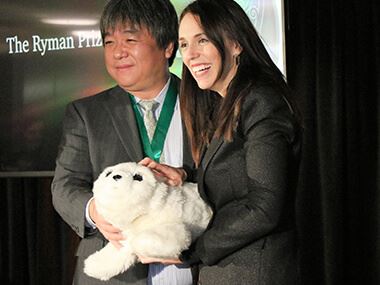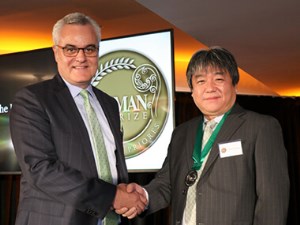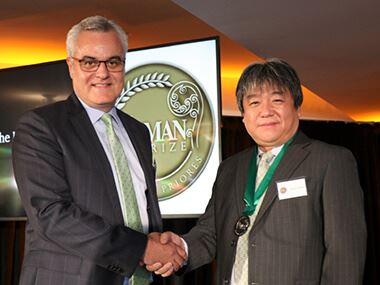Professor Takanori Shibata has been awarded the 2018 Ryman Prize in recognition of his more than 25 years of ground-breaking research into new technology to help older people.
Professor Shibata, an artificial intelligence (AI) and robotics pioneer, was presented with the prize by NZ Prime Minister Jacinda Ardern at a special ceremony in Auckland this week.
The Ryman Prize is an annual $250,000 international award for the best work carried out anywhere in the world that has enhanced quality of life for older people. It is the richest prize of its kind in the world.
Professor Shibata, Chief Senior Research Scientist at the National Institute of Advanced Industrial Science and Technology (AIST) in Japan, was awarded this year’s prize for his tenacity in pursing new technology to help ease the burden of older people suffering from dementia.
In 1993 he set out to use the latest advances in artificial intelligence and robotics to create a device that would be a practical help to older people with conditions such as dementia.
His product, PARO, is a drug-free therapeutic robot that uses sensors, robotics and sophisticated Artificial Intelligence software to mimic a real seal.
Drug-free therapeutic alternative
It has been proven as a drug-free therapeutic alternative to improve mood, reduce anxiety, decrease perception of pain, enhance sleep and decrease feelings of loneliness in patients.
PARO has been in production since 2005 and is used in 30 countries.
The Japanese inventor was delighted to win and said he would be using the money to invest in more research.
“I am extremely proud to have won the Ryman Prize,’’ Professor Shibata said.
“It represents a lot of work over the past 25 years, but I couldn’t have done it without the support of many people and my family.
“I set out to find a way to use technology as an alternative drug-free therapy to ease the suffering of patients with dementia.
“The health challenges faced by older people are enormous and growing but technology is changing just as quickly.
“We’ve proved that this is possible, and that Artificial Intelligence has huge potential for the future. We’ve pioneered a way of working but there is a lot more work to do.’’
Health pioneer
Professor Shibata has been a pioneer in the field of the health of older people for more than two decades.
His discoveries are likely to influence the future of healthcare.
He was inspired by seeing the benefits that animal therapy could bring to dementia patients and set about creating a robot that could soothe and reassure patients by responding to touch and speech.
The advantage of a robot is that it is infection-free and completely safe to use. And it doesn’t bite or need feeding.
As well as winning recognition as a licenced medical device by the FDA, the design excellence behind PARO has been recognised with it being included in exhibitions at the Victoria and Albert Museum, the Louvre and the Museum of Modern Art.
Professor Shibata has spent more than 20 years constantly refining and improving PARO and has won over many sceptics with his advocacy for robotics in what can be a controversial field of care.
The device is now in its ninth generation, having been constantly refined and updated as robotics, AI and computing power improve.
About the Ryman Prize
The Ryman Prize is administered by the Ryman Foundation. The annual prize consists of a $250,000 grant which is awarded by an international jury to the best invention, idea, research concept or initiative that has enhanced quality of life for older people.
It is the world’s richest prize of its type and was established to create the equivalent of a Nobel Prize for people working in the field of the health of older people.
The prize was launched in 2015 and the inaugural prize was won by Gabi Hollows, the founding director of The Fred Hollows Foundation.
Gabi Hollows set up the charity with her late husband Professor Fred Hollows, and together they worked tirelessly to tackle the problem of preventable blindness in the developing world.


